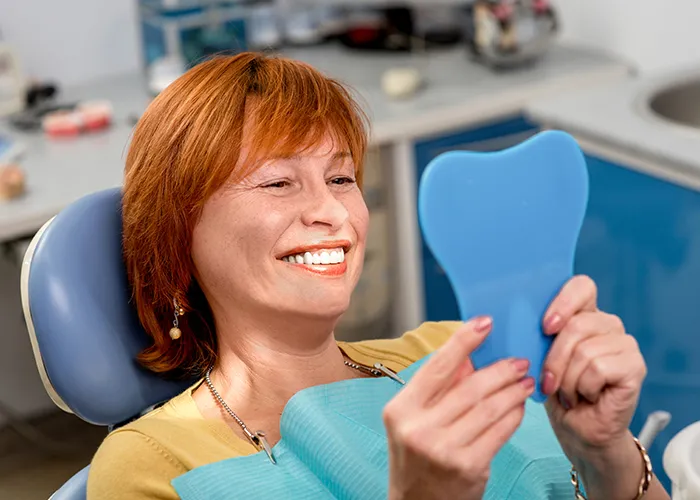


Your denture may initially feel loose until your cheeks, tongue, and muscles adapt. They may also feel bulky and make your tongue feel crowded. Your mouth may feel sore or irritated. If excessive soreness occurs, you should see your dentist. It may be that you need a slight adjustment. Keep your denture out as much as possible when soreness occurs.
You may find it difficult to chew at first. Start with soft foods and cut your food into small pieces, chewing on both sides with your back teeth. Practice at home first before eating in public. Dentures are designed to chew up and down, not side to side.
To get used to speaking with your new dentures, practice reading aloud. The “S” sound will take the longest to learn.
You may wear your dentures throughout the day. Call your dentist for an appointment to adjust the dentures if soreness occurs. One way to get used to wearing dentures is to wear the dentures for 6 hours the first day and then increase wearing time by 1/2 to 1 hour per day until you are wearing your dentures comfortably. We also recommend taking your dentures out at night to give your gum tissue a chance to rest and help maintain good oral hygiene. If your dentures are not in your mouth, they must be soaked in water.
To remove plaque, brush your gums, tongue, and palate with a soft toothbrush or a wet washcloth. There are many cleansers available for dentures. We recommend Stainaway Plus, Kleenite, or Stainaway for Partials. (If you cannot find these in the supermarket or pharmacy, you can purchase them in case lots by calling (800) USA-1525. Stainaway can be bought by the box on the Internet at (www.medichest.com). Dentucream toothpaste is sold in the toothpaste aisle at the supermarket. You can use this to brush your dentures before soaking them in the soaking mentioned above cleansers. Many prefer to brush their dentures with baking soda, hand soap, or mild dish soap. NEVER USE BLEACH!
Most breaks and cracks can be repaired in a couple of hours. Call the office to schedule a time. Using Superglue or a do-it-yourself kit may make it harder to fix the denture.
Dentures can become loose over time. This is because your gum tissue and bones continually shrink and change while your denture stays the same. A permanent reline may be necessary to get the best fit possible from your denture. Regular checkups are recommended every two years to check for disease, check the fit of the denture, and clean and polish your denture. If your old dentures are in good repair, they can be kept as a spare set in an emergency. To keep your dentures in good shape, clean them thoroughly, dry them completely, and place them in a zip-lock bag in your freezer.